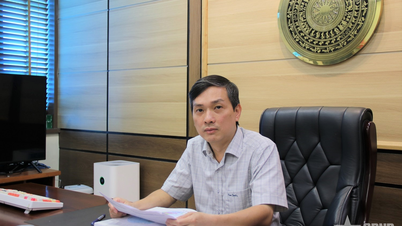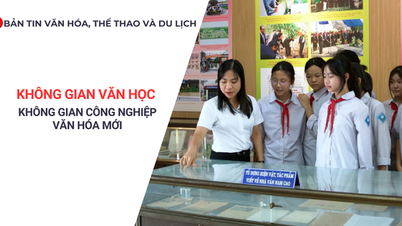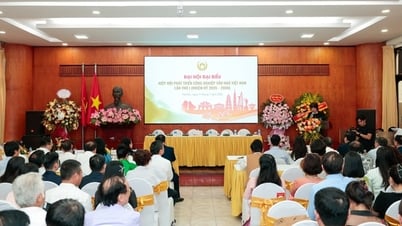In the current universityeducation system, it is necessary to conduct statistical research on how many institutions have the conditions to implement innovation in education and which institutions have the conditions but do not implement innovation because in reality, innovation depends not only on individuals but also on the collective leadership and the environment of the entire system. From there, there will be a comprehensive, multi-dimensional view of innovation in universities today, contributing to appropriate policy adjustments and supplements.

Promoting innovation networks in universities and colleges in Vietnam. Photo: internet.
Recently, the National Innovation Center (NIC) in collaboration with the Vietnam University and College Innovation and Entrepreneurship Network (VNEI) and the Hanoi Enterprise Support Center (SCE) organized the Workshop “Innovation and Entrepreneurship in Vietnam’s Higher Education: Dynamism and Cooperation”. The workshop is part of a series of activities to celebrate the 5th anniversary of the establishment of NIC and the Vietnam Innovation Day 2024.
The workshop is a bridge between universities and colleges with the Vietnamese innovation ecosystem, and at the same time shares advanced university models in developing innovation and startups. This is also an opportunity for universities, businesses and policy agencies to meet, discuss and share experiences in developing innovative university models, thereby enhancing the role of higher education in promoting startups and innovation. In his opening speech, Mr. Vu Quoc Huy - Director of NIC affirmed the role and importance of innovation in the university education system in particular and innovation in general in the journey to realize the goal of "building a strong country". At the same time, he expressed his hope and confidence in the effectiveness of coordination in cooperation in training high-quality human resources between domestic and international universities and NIC. He emphasized that in recent times, VNEI has developed rapidly with many exciting activities and has been highly appreciated. In the coming time, the relevant parties will further strengthen close coordination to implement the tasks of innovation in general and develop VNEI in particular, further improve the quality of VNEI's operations, collect and present opinions of member networks to propose appropriate mechanisms and policies to competent authorities, promote the innovation network in general and the innovation network in universities and colleges in particular. Sharing about some current Swiss innovation models, Mr. Hub Langstaff - Director of the SwissEP Program in Vietnam said that the Swiss support program on building an innovation and startup ecosystem deployed in 7 developing countries including Vietnam has emphasized the great potential of innovation in Vietnam today. And proposed some recommendations that need to be overcome so that the innovation ecosystem can truly be effective.  Sharing the same view, Dr. Sarah Mamiese, Director of the French Development Agency (AFD Campus) highly appreciated Vietnam's recent innovation activities, especially the establishment and development of NIC as a successful symbol of future-oriented innovation along with Vietnam's enthusiasm and passion for innovation. Dr. Sarah Mamiese also shared that innovation is a decisive factor in the context that the whole world is looking for solutions for sustainable and effective development, economic development without increasing environmental impact. According to Dr. Sarah Mamiese, circular economic orientations can allow for the reconciliation of economic development with environmental protection and humanity... therefore, conducting practical research activities in an innovative approach to find truly effective solutions, avoid innovation traps and master innovation for a better future is extremely necessary. Dr. Tran Nam Tu - Deputy Director in charge of the Department of Science, Technology and Environment, Ministry of Education and Training said that in the near future, the Ministry of Education and Training will also issue two projects on "Training human resources to serve high-tech development in the period of 2025-2035 and orientation to 2045" and "Developing high-quality human resources to meet the requirements of the Industrial Revolution 4.0". These two projects aim to prepare abundant high-tech human resources, especially a large team of experts in artificial intelligence and semiconductors, to become Vietnam's competitive advantage in attracting investment from large technology corporations in the world, contributing to the economic restructuring and sustainable development of the country based on science, technology and innovation, digital transformation and green transformation. The Industrial Revolution 4.0 in particular will dramatically change the labor structure and labor market. The automation system will gradually replace manual labor in the entire economy, the shift from labor to machines will increase the gap between profit on capital and profit on labor, which will affect the income of simple workers and increase unemployment. Accordingly, human resource training at universities needs to focus on redesigning training programs, innovating teaching and learning methods, improving soft skills for students, creating links between schools and businesses, improving the quality of technology incubators, innovating the state management mechanism for vocational training according to market needs and specific requirements of employers... all to meet the requirements of deep and sustainable integration, highlighting the picture of Vietnam's innovation on the world map./.
Sharing the same view, Dr. Sarah Mamiese, Director of the French Development Agency (AFD Campus) highly appreciated Vietnam's recent innovation activities, especially the establishment and development of NIC as a successful symbol of future-oriented innovation along with Vietnam's enthusiasm and passion for innovation. Dr. Sarah Mamiese also shared that innovation is a decisive factor in the context that the whole world is looking for solutions for sustainable and effective development, economic development without increasing environmental impact. According to Dr. Sarah Mamiese, circular economic orientations can allow for the reconciliation of economic development with environmental protection and humanity... therefore, conducting practical research activities in an innovative approach to find truly effective solutions, avoid innovation traps and master innovation for a better future is extremely necessary. Dr. Tran Nam Tu - Deputy Director in charge of the Department of Science, Technology and Environment, Ministry of Education and Training said that in the near future, the Ministry of Education and Training will also issue two projects on "Training human resources to serve high-tech development in the period of 2025-2035 and orientation to 2045" and "Developing high-quality human resources to meet the requirements of the Industrial Revolution 4.0". These two projects aim to prepare abundant high-tech human resources, especially a large team of experts in artificial intelligence and semiconductors, to become Vietnam's competitive advantage in attracting investment from large technology corporations in the world, contributing to the economic restructuring and sustainable development of the country based on science, technology and innovation, digital transformation and green transformation. The Industrial Revolution 4.0 in particular will dramatically change the labor structure and labor market. The automation system will gradually replace manual labor in the entire economy, the shift from labor to machines will increase the gap between profit on capital and profit on labor, which will affect the income of simple workers and increase unemployment. Accordingly, human resource training at universities needs to focus on redesigning training programs, innovating teaching and learning methods, improving soft skills for students, creating links between schools and businesses, improving the quality of technology incubators, innovating the state management mechanism for vocational training according to market needs and specific requirements of employers... all to meet the requirements of deep and sustainable integration, highlighting the picture of Vietnam's innovation on the world map./.

Sharing innovative models of universities around the world . Photo: Internet.
Thu Hang










![[Photo] International community congratulates Vietnam on having more landscapes recognized as World Cultural Heritage](https://vphoto.vietnam.vn/thumb/1200x675/vietnam/resource/IMAGE/2025/7/13/58ec71f73ae644bfb5bab9c99043bb7d)

















































![[Photo] International community congratulates Vietnam on having more landscapes recognized as World Cultural Heritage](https://vphoto.vietnam.vn/thumb/402x226/vietnam/resource/IMAGE/2025/7/13/58ec71f73ae644bfb5bab9c99043bb7d)







































Comment (0)